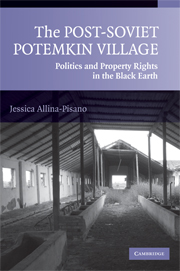Book contents
- Frontmatter
- Contents
- List of Maps, Illustrations, and Tables
- Acknowledgments
- Note on Transliteration
- Note on Sources and Methodology
- Glossary
- Two regions of the Black Earth, Voronezh and Kharkiv oblasti, 1991–present
- Voronezh oblast' in the twenty-first century
- Kharkiv oblast' in the twenty-first century
- The Post-Soviet Potemkin Village
- Introduction: Land Reform in Post-Communist Europe
- 1 Things Fall Apart
- 2 Keeping the Collectives
- 3 The Social Origins of Private Farmers
- 4 A Return to Regulation
- 5 The Politics of Payment
- 6 The Facade
- Conclusion: Rural Proletarians in the Potemkin Village
- Index
2 - Keeping the Collectives
Published online by Cambridge University Press: 27 July 2009
- Frontmatter
- Contents
- List of Maps, Illustrations, and Tables
- Acknowledgments
- Note on Transliteration
- Note on Sources and Methodology
- Glossary
- Two regions of the Black Earth, Voronezh and Kharkiv oblasti, 1991–present
- Voronezh oblast' in the twenty-first century
- Kharkiv oblast' in the twenty-first century
- The Post-Soviet Potemkin Village
- Introduction: Land Reform in Post-Communist Europe
- 1 Things Fall Apart
- 2 Keeping the Collectives
- 3 The Social Origins of Private Farmers
- 4 A Return to Regulation
- 5 The Politics of Payment
- 6 The Facade
- Conclusion: Rural Proletarians in the Potemkin Village
- Index
Summary
Amidst the economic crises that plagued Black Earth villages in the months following the Soviet collapse, the news that collective and state farms were to be privatized and, perhaps, disbanded was met with consternation in the countryside. In the early and mid-1990s, when land privatization first took place, political instability added to the burden that local elites faced in reforming major rural institutions. Just as collective farms had begun to adapt to emerging market conditions and had started to withdraw from the web of state control and incentives that characterized late Soviet life, reorganization policy brought the state back into the village.
Those charged with overseeing privatization were local officials, including heads of district administrations, state agricultural management officers, land tenure specialists, and members of land committees and village councils. Members of each of these categories had their own, distinct views on privatization, but their strategies in implementing reform usually converged under the leadership of district heads. Chairmen of collective farms and directors of state farms, hereafter referred to as farm directors, took part in the task at the enterprise level. However, they represented their own interests as businessmen during the process and were no longer employed by the state after the first, early round of enterprise reorganization.
Unsure of their political fortunes in an environment of uncertainty, and struggling to make decisions that would satisfy the current regime but forestall possible retribution by future leaders, local elites responded to initiatives from Moscow and Kyiv with dissimulation.
- Type
- Chapter
- Information
- The Post-Soviet Potemkin VillagePolitics and Property Rights in the Black Earth, pp. 53 - 84Publisher: Cambridge University PressPrint publication year: 2007

